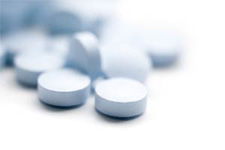Expired Vitamins

The Facts about Expired Vitamins
We live in a throwaway society and discard everything once it has become dated, so it is no wonder that most people think that anything with an expired date is no good, and that includes expired vitamins. But, are vitamins that are beyond their expiration date still good?
If you asked that question to a group of people you would probably get pretty much a 50/50 response. Some people are so afraid of getting sick that they would never ever use anything after the expiration date whether it be expired food or expired vitamins. Others think that the expired date is simply a guideline and that “expired anything” is still good. After all, even meats can be used for at least three to five days beyond the date of expiration.
|
|
The truth about expired vitamins is that they are still good after the expiration date marked on the package. Extensive self-testing is done by vitamin manufacturers on their products. What happens after the expiration date is that some vitamins start to lose their potency. This doesn’t happen in a day or two, or in most cases even in a month or two. But at some point, the vitamin will start to lose its potency.
That means, for example, that if a vitamin is 500 mg when you purchased it, after the expiration date it is more likely to be 480. And, some vitamins never ever lose their potency at all. One of these is calcium. If you store your vitamins properly, which is in a cool, dry place, out of the sunlight, and in their airtight containers, the vitamins should be stable for at least four of five years without even losing potency.
|
|
So, if you see a really good deal on three-years worth of vitamins, should you go for it? Absolutely. At least anything bad happening because of length of time in storage should not be a worry. This does not apply to vitamins which are liquids. They should be disposed of at the expiration date, otherwise bacteria and fungi can form and that could cause illness.
Vitamins such as aspirin, which usually comes in pressed tablet form would be the first to start to lose potency. Vitamins which come coated or in capsules will last the longest. And, if you want your vitamins to last a long time, do not store them in the bathroom or the kitchen. These two places are often the most common ones for storing vitamins and other medicines but the humidity and heat in these rooms will cause the vitamins to decompensate quicker.
The refrigerator is also not the place to store vitamins. Constantly taking the bottles in and out of the cold and opening them will cause condensation to form in the bottles and result in the vitamins lasting not as long as they should. If you buy thousands of vitamins at a time, you can use the refrigerator to your advantage. It is okay to take out a three-month supply, reseal the package and place it in the refrigerator. When you need to take out another three-month supply, take the package out and let it sit until it reaches room temperature before opening it. Once again you can reseal and refrigerate. Bringing it to room temperature before opening is critical in stopping condensation.
Contrary to popular belief, the FDA does not require expiration dates on vitamins and supplements. Manufacturers feel it is to their advantage to stamp the packages with dates. It means that they are only responsible for the quality of the product until the expiration date. Miles Laboratories, which manufactures One-A-Day, Flintstones, and other vitamins, selects an expiration that is three years from the date the vitamins were manufactured.
If you use up your vitamins and supplements before they have expired, you will be guaranteed by the company that they are at full potency. But, if you end up with expired vitamins, the chances are pretty good they are still potent.